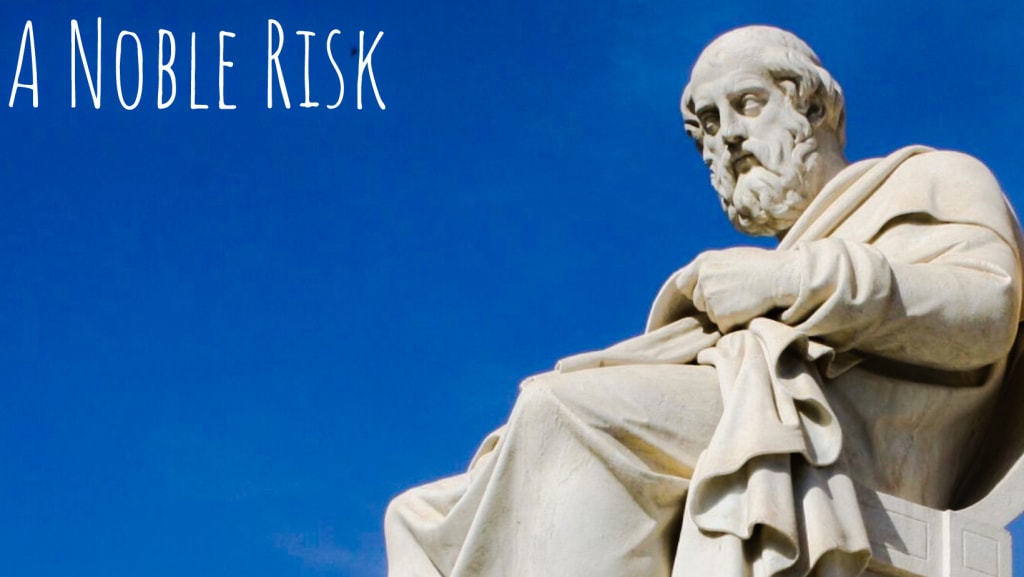
Plato’s dialogue, Phaedo, is a fictional retelling of the final hours of Socrates’ life in the jail at Athens. At the end of the dialogue, Socrates’ sentence is carried out, he accepts and consumes a drink poisoned with hemlock.
The Phaedo recounts a conversation Socrates has with friends, Simmias and Cebes, during the final hours of his life. The dialogue focuses on the immortality of the soul. Socrates provides several different arguments supporting the immortality of soul. These arguments are naturally tied to Plato’s other ideas - for instance, the view that knowledge is recollection and an emphasis on using reason to pursue truth and knowledge.
Near the end of the dialogue, Socrates describes what he believes happens to or awaits the soul upon death, and it is this part of the dialogue that always caught my attention. Socrates explains that a (good) person shouldn’t fear death “if during his life he has ignored the pleasures of the body…and adorned his soul not with alien but with its own ornaments, namely, moderation, righteousness, courage, freedom, and truth” (Plato). He believes that those who live in the right way will be rewarded after death and their souls will be taken to “even more beautiful dwelling places” (Plato 114c-115).
"if during his life he has ignored the pleasures of the body…"
Socrates’ belief that a better afterlife awaits those who live a good life or live a virtuous (or moral) life is not all that surprising. He makes an interesting remark, however, after describing what he believes happens to the souls of individuals who lived good lives: “No sensible man would insist that these things are as I have described them, but I think it is fitting for a man to risk the belief—for the risk is a noble one” (Plato 114d).
"it is fitting for a man to risk the belief—for the risk is a noble one."
Why does Socrates spend most of the dialogue offering what he presumably takes to be strong arguments in favor of the immortality of the soul, only to then call into question the discussion of such things as what happens to the soul after death? Why is it risky to believe that a better afterlife awaits the good?
A Noble Risk
“No sensible man would insist that these things are as I have described them, but I think it is fitting for a man to risk the belief—for the risk is a noble one.”
Plato
Socrates believes that the risk in believing that a better afterlife awaits those who live in the right way is noble because the belief fosters and promotes positive self-development, moral growth and maturity, and self-control and cultivation. When we believe that there is a purpose for living a certain way, we are more likely to be motivated to live that way, especially when the stakes are high. The quality of our afterlife certainly presents sufficiently high stakes to motivate us if we believe that the stakes exist.
We “risk the belief” because it is one that can neither be proven nor one that we can offer a full rational account of. We therefore risk the belief insofar as believing in it means, for instance, believing in something that may turn out to be wrong, that cannot be empirically verified, and/or that cannot be fully articulated or accounted for. It is a risky belief, then, because it is simply that—a belief.
Socrates seems to think we are justified in risking this belief (or something like it) because it provides the (necessary) basis upon which we can conceive of ourselves as agents who are accountable for their own actions and who have and find value or worth in things beyond the mere “pleasures of the body” (or beyond the sensible). It is therefore the belief in the idea of the person as not wholly reducible to the mere sensible/physical that, for Socrates, creates an interest in living a good life and cultivating the right character.
Plato’s interest in the Phaedo is perhaps to understand and hopefully ground the ideas and beliefs that human beings qua rational beings appear to need to readily conceive of their own agency and thus think of themselves in a twofold way (as human beings and as rational beings). Since the Phaedo is dominated by arguments concerning the immortality of the soul, it makes sense that he would end the dialogue with a characterization of the role belief plays and why it is important.
We might also suggest that the belief in an afterlife where the good are rewarded is a noble belief because with it we are motivated to be good persons and thus improve the quality of human social organization. Humanity benefits, in other words, when there is a belief that motivates individuals to conform their behavior to moral norms, when individuals believe that there are serious consequences for taking choice lightly or acting irrationally.
Do you agree with Plato? Is there a noble risk in believing in the afterlife because such a belief motivates us to be better people and live better lives?
Thanks for reading
Please see my author's page and related work: Curiosity, Perplexity, and the Wisdom of Socrates; The Habit of Thinking; and Living Underground.
About the Creator
Dan Garro
Philosopher/Educator/Writer/Podcast Host & Producer
I'm a philosophy professor, avid reader, I love writing, and I co-host/produce The Existential Stoic Podcast.






Comments
There are no comments for this story
Be the first to respond and start the conversation.